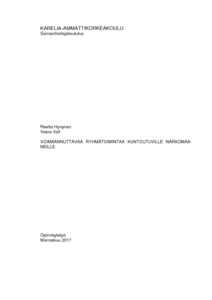VOIMAANNUTTAVAA RYHMÄTOIMINTAA KUNTOUTUVILLE NARKOMAANEILLE
Vall, Veera; Hynynen, Reetta (2017)
Vall, Veera
Hynynen, Reetta
Karelia-ammattikorkeakoulu (Pohjois-Karjalan ammattikorkeakoulu)
2017
All rights reserved
Julkaisun pysyvä osoite on
https://urn.fi/URN:NBN:fi:amk-2017112818558
https://urn.fi/URN:NBN:fi:amk-2017112818558
Tiivistelmä
Huumeiden käyttäjistä noin 80 % on ongelmakäyttäjiä. Opioidikorvaushoitoon hakeu-tuvista henkilöistä lähes kaikki ovat päihteiden sekakäyttäjä. Keskimäärin hoitoon tule-vat henkilöt ovat noin 30-vuotiaita. Terapeuttinen yhteisöhoito ja yhteisö ovat yleisty-neet hoitomuotoina suomalaisessa sosiaali-, terveys- ja kasvatusjärjestelmässä. Yhtei-söhoito perustuu ihmisen kokonaisvaltaiseen psyykkiseen, fyysiseen ja sosiaalisen hyvinvointiin.
Opinnäytetyön toimeksiantaja oli psykososiaalista huumekuntoutusta Pohjois-Karjalassa tarjoava KostamoKoti Oy. Opinnäytetyön tarkoitus oli edesauttaa yksilön voimaantumista. Tavoitteemme oli, että kuntoutujille jäisi työkaluja päihteettömään elämään. Opinnäytetyön tehtävä oli järjestää ryhmätoimintaa kuntoutuville narkomaa-neille. Opinnäytetyön avulla tutustuimme psykososiaaliseen kuntoutukseen sekä saimme kokemusta lääkeriippuvaisen asiakkaan kohtaamiseen.
Ryhmäläiset saivat itselleen yhdessä harjoittelemiamme voimauttavia keinoja, joita he voivat hyödyntää päihteettömässä elämässään. Ryhmällemme suunniteltua toimintaa on helppo muokata ja soveltaa erilaisten ryhmien toimintaan soveltuvaksi. Jatkokehi-tysmahdollisuutena aiheesta voisi tehdä tutkimuksellisen opinnäytetyön laadullisen tutkimuksen menetelmin.
Opinnäytetyön toimeksiantaja oli psykososiaalista huumekuntoutusta Pohjois-Karjalassa tarjoava KostamoKoti Oy. Opinnäytetyön tarkoitus oli edesauttaa yksilön voimaantumista. Tavoitteemme oli, että kuntoutujille jäisi työkaluja päihteettömään elämään. Opinnäytetyön tehtävä oli järjestää ryhmätoimintaa kuntoutuville narkomaa-neille. Opinnäytetyön avulla tutustuimme psykososiaaliseen kuntoutukseen sekä saimme kokemusta lääkeriippuvaisen asiakkaan kohtaamiseen.
Ryhmäläiset saivat itselleen yhdessä harjoittelemiamme voimauttavia keinoja, joita he voivat hyödyntää päihteettömässä elämässään. Ryhmällemme suunniteltua toimintaa on helppo muokata ja soveltaa erilaisten ryhmien toimintaan soveltuvaksi. Jatkokehi-tysmahdollisuutena aiheesta voisi tehdä tutkimuksellisen opinnäytetyön laadullisen tutkimuksen menetelmin.
